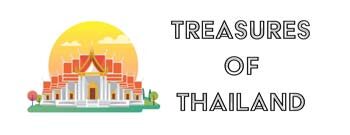During my travels in Thailand, I quickly realized that picking up common Thai words and phrases was more than just a survival skill.
It was a gateway into the heart of Thai culture, a way to forge connections with locals, and a secret weapon for navigating everything from street food stalls to bustling city transit.
So, I decided to create my own language guide based on my own experiences and adventures. This list of basic Thai phrases and words isn’t just about helping you order your meals or asking for directions.
It’s about enhancing your travel experience, making unforgettable connections, and truly soaking in the Thai culture.
Ready to add some Thai to your language repertoire? Let’s dive in!
Thai Language Basics
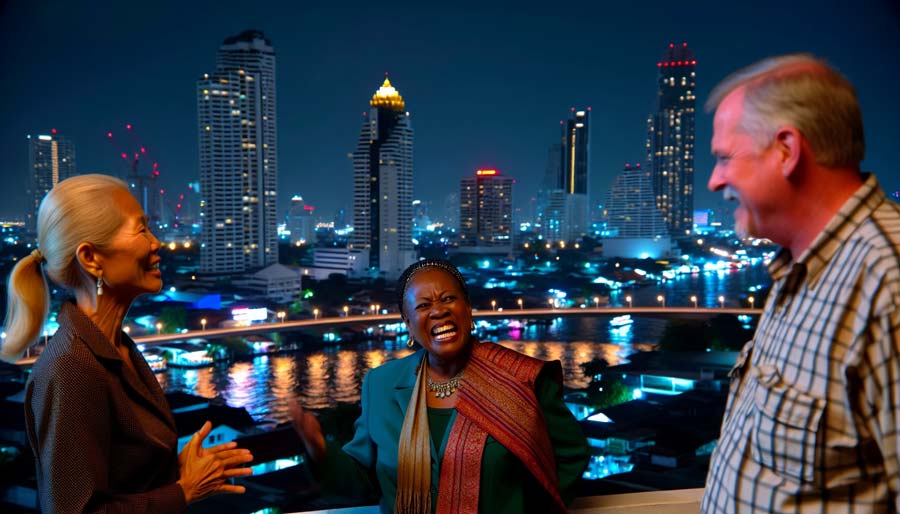
Thai is unquestionably one of the hardest languages to learn. From the unique script, which honestly looks like scribble (especially after a night out), to the tonal nature, learning Thai can be intimidating.
While Thai doesn’t have gendered nouns (like Spanish), tenses, or plural forms, the sentence structure can change based on the gender of the speaker.
Chan / Phom
For example, the words Chan and Phom both mean I, but depending on the gender of the speaker, you’ll use one and not the other.
For example, to say I’m sorry in Thai:
- For male speakers – Phom kor toht (krab)
- For female speakers – Chan kor toht (kha)
You must also pay attention to the use of (krab/kha), which depends on your gender as well.
Krab / Kha
Krab and Kha are two words used to show politeness at the end of a sentence or phrase. For male speakers, you add the word krab at the end, and for female speakers, you add the word kha at the end.
That is why the most common phrase in Thai – Sawadee, is usually pronounced “Sawadee kha” because it is said by a woman. If it was said by a man, then it would be “Sawadee krab”.
Knowing these two rules will help you when learning the Thai words and phrases below!
Basic Phrases in Thai
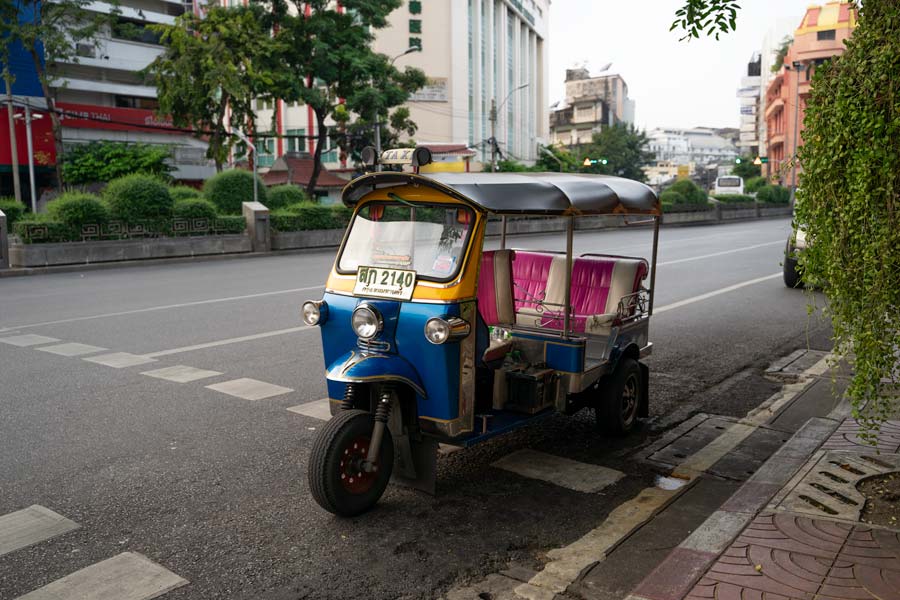
Below are some of the basic phrases in Thai that you’ll inevitably come across on your travels. They are super simple and it is a great way to show the Thai locals that you appreciate their culture!
The two words we highly recommend you to remember are Hello – sawadee (krab/kha) and Thank you – Kop kun (krab/kha). I literally use these two words every day when I’m in Thailand.
- Hello – Sawadee (krab/kha)
- Goodbye – Lakon (krab/kha)
- Please – Dai broht
- Thank You – Kop kun (krab/kha)
- You’re welcome – Duay kwaam yin dee (krab/kha)
- Excuse me – Kor a nu yaart (krab/kha)
- I’m sorry – Chan/Phom kor toht (krab/kha)
- Do you speak English? – Khun poot paa saa ang grit daai mai? (krab/kha)
- I don’t understand – Chan/Phom mai kaow jai (krab/kha)
- Where is the bathroom? – Hong naam you tee nai? (krab/kha)
- How much does this cost? – Raa kar tao rai? (krab/kha)
- Enjoy your meal – Taan hai a roi (krab/kha)
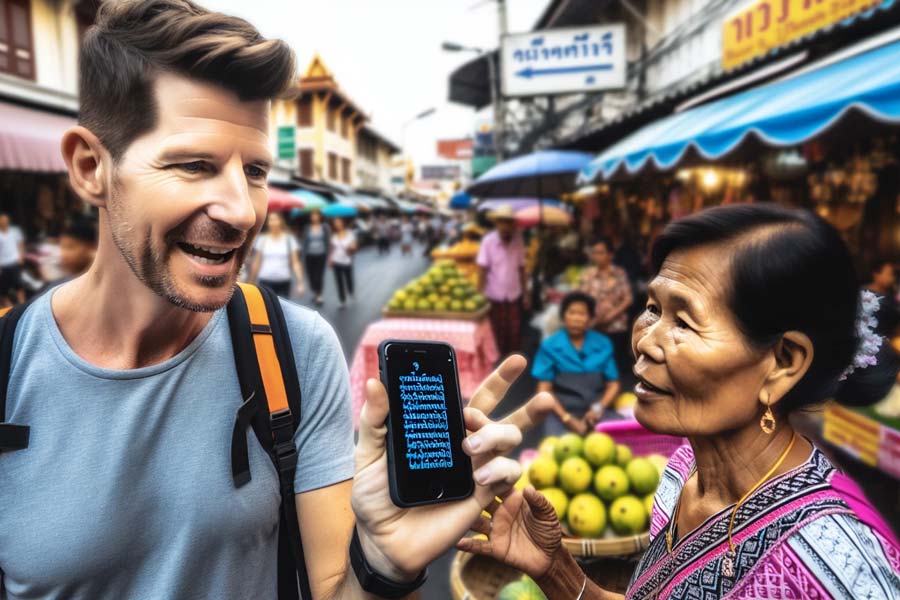
- What is the Wi-Fi password? – Ra hat paan Wi Fi lek a rai? (krab/kha)
- Could you take a photo of us, please? – Khun chuuay taai roop puuak rao noi daai mai? (krab/kha)
- I would like to order food – Chan/Phom yaak jansang aa haan noi (krab/kha)
- What do you recommend? – Khun yaak nae nam a rai? (krab/kha)
- Could I get the bill, please? – Chan/Phom kor kit ngern noi daai mai? (krab/kha)
- Do you accept credit cards? – Khun rap but kray dit mai? (krab/kha)
- Can I have a bottle of water, please? – Chan/Phom kor naam kuuat neung noi dai mai? (krab/kha)
- Can I have some ice, please? – Chan/Phom kor naam kaeng noi daai mai? (krab/kha)
???? Note: Be careful when you are ordering ice in Thailand. Because the tap water is not safe to drink in Thailand, you’ll want to make sure the ice comes from bottled water and filtered water.
- I’m looking for the bus station – Chan/Phom gam lang haa sa taa nee kon song (krab/kha)
- I’m vegetarian. Do you have any vegetarian dishes? – Chan/Phom bpen Maleg sa wi rat khun mee ar haan Maleg sa wi rat mai? (krab/kha)
- This food is too spicy for me. – Ar haan nee mun ped gern bpai sam rap chan (krab/kha)
- Can I have the menu, please? – Chan/Phom kor may nu noi daai mai? (krab/kha)
- That’s too expensive, can you lower the price? – Mun raa kaa soong bpai khun chuuay lod hai noi daai mai? (krab/kha)
- Where can I catch the bus to…? – Chan/Phom ja keun rot bas bpai tee nai daai baang…? (krab/kha)
- I’m allergic to… – Chan/Phom mai por jai tee… (krab/kha)
- Can I have it without…? – Chan/Phom mai aow daai mai…? (krab/kha)
- Can I have a table for two, please? – Chan/Phom kor dto sam rap song kon noi daai mai? (krab/kha)
- I can’t speak Thai – Chan/Phom poot Thai mai daai
Basic Thai Words For Tourists
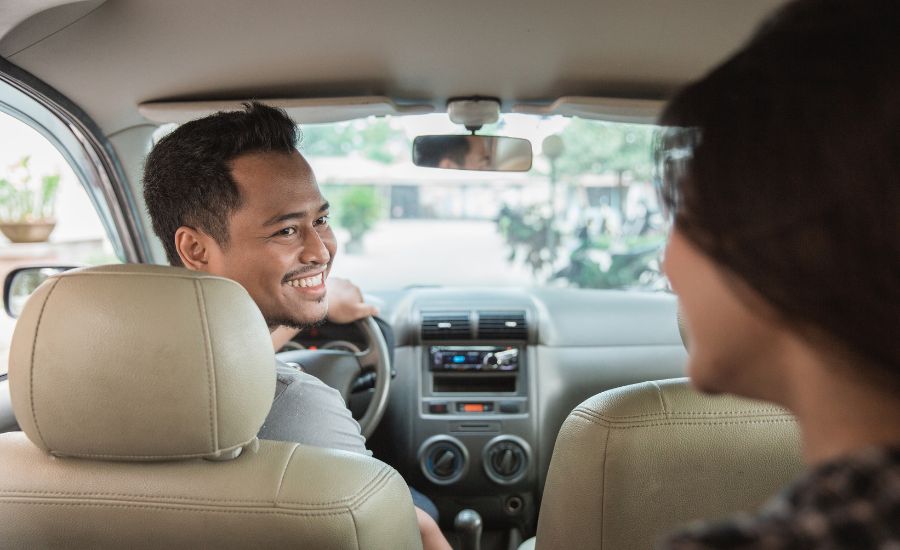
Besides phrases, there are some common Thai words that you’ll come across as tourists. These are perfect for getting around the city, ordering food, and expressing yourself.
- Yes – Chai (krab/kha)
- No – Mai (krab/kha)
- Food – Ar harn
- Water – Naam
- Beer – Beer
- Rice – Kaow
- Chicken – Gai
- Pork – Neuua moo
- Beef – Nueuua wuua
- Fish – Bplaa
- Vegetables – Pak
- Fruit – Pon la mai
- Tea – Chaa
- Coffee – Gaa fae
- Salt – Gleuua
- Hot (spicy) – Ped
- Not spicy – Mai ped
???? Editor’s Note: Thai spicy is another level of spicy. I’m used to spicy food and I still ask for mild spicy, and even then, it is usually too spicy for me. So make sure you remember the word “Mai ped” for no spicy in Thai!
- Hot (temperature) – Ron
- Cold – Yen
- Good – Dee
- Bad – Mai dee
- Big – Yaii
- Small – Lek
- Today – Wan nee
- Tomorrow – Prung nee
- Yesterday – Meuua waan
- Help! – Chuuay duuay
- Sweet – Waan
- Delicious – Aa roi
- Desert – Kong waan
- Breakfast – Aa haan chao
- Lunch – Meu tiiang
- Dinner – Meu yen
- Temple – Wat
- Muay Thai – Muay Thai
- Museum – Pi pit ta pan
- Elephant – Chang
???? Fun Fact: Chang also happens to be the No.1 brand of beer in Thailand. Make sure you give it a try when you are there!
- Thai Massage – Nuad paen thai
- Floating Market – Dta laat naam
- Scooter – Sa goot ter
- Foreigner – Farang
- Entrance – Taang kao
- Exit – Taang ork
- Air-conditioning – Kreuang bprap ar gart
- Bathroom/Toilet – Hong naam
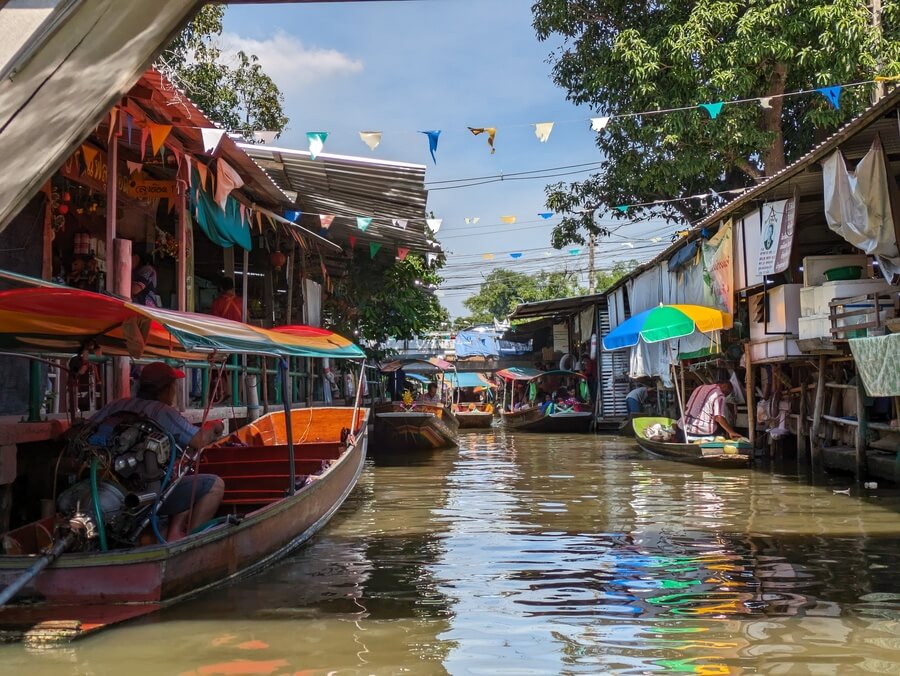
- Pull – Deung
- Push – Plak
- Gentlemen – Poo chaai
- Ladies – Poo ying
- Where Is …? – … Yoo tee nai?
- Bus Station – Bpaai rot may
- Airport – Sa nam bin
- Ticket – Dtuua
- Party – Bpaa dtee
- ATM Machine – Dtoo ay tee em
- Train Station – Sa taa nee rot fai
- Price – Ra kha
- Free (no charge) – Free
- Credit Card – Bud kray dit
- Hospital – Rohng pa ya baan
- Police – Tam ruuat
Useful Greetings In Thai
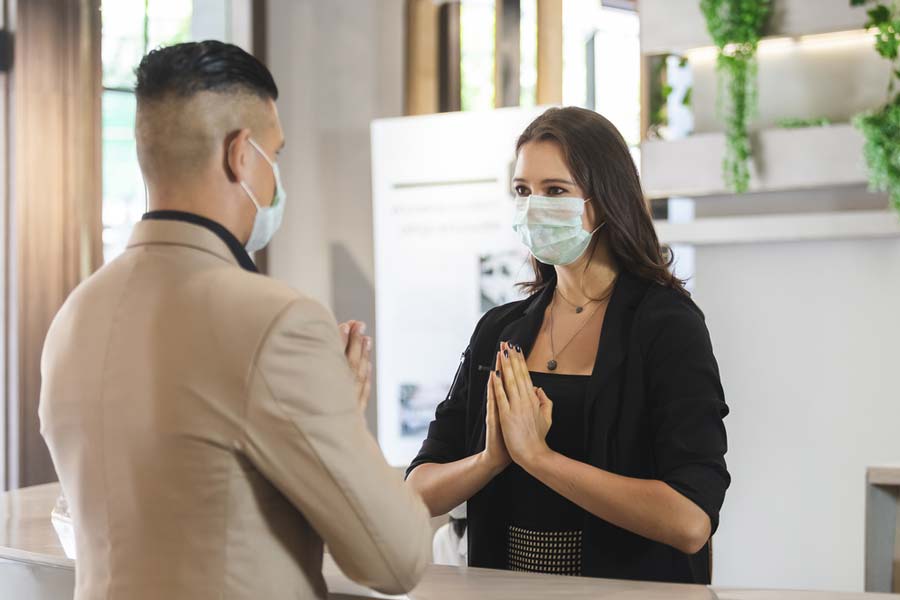
Thai greetings are perfect to break the ice with a local or someone you just met on a night out. These are a great way to show appreciation for their culture and show that you are interested in them!
- How are you? – Sa baai dee mai (krab/kha)
- What’s your name? – Khun cheu a rai (krab/kha)
- My name is… – Chan/Phom cheu … (krab/kha)
- Nice to meet you – Yin dee tee dai roo jak (krab/kha)
- Where are you from? – Khun ma jark tee nai? (krab/kha)
- I’m from… – Chan/Phom ma jark (krab/kha)
- Good morning – Sa wat dee yaam chao (krab/kha)
- Good afternoon – Sa wat dee dton bai (krab/kha)
- Good evening – Sa wat dee dton yen (krab/kha)
- Good night – Raa dtree sa wat (krab/kha)
???? Read More: Romantic Phrases in Thai For Flirting!
Easy Numbers In Thai
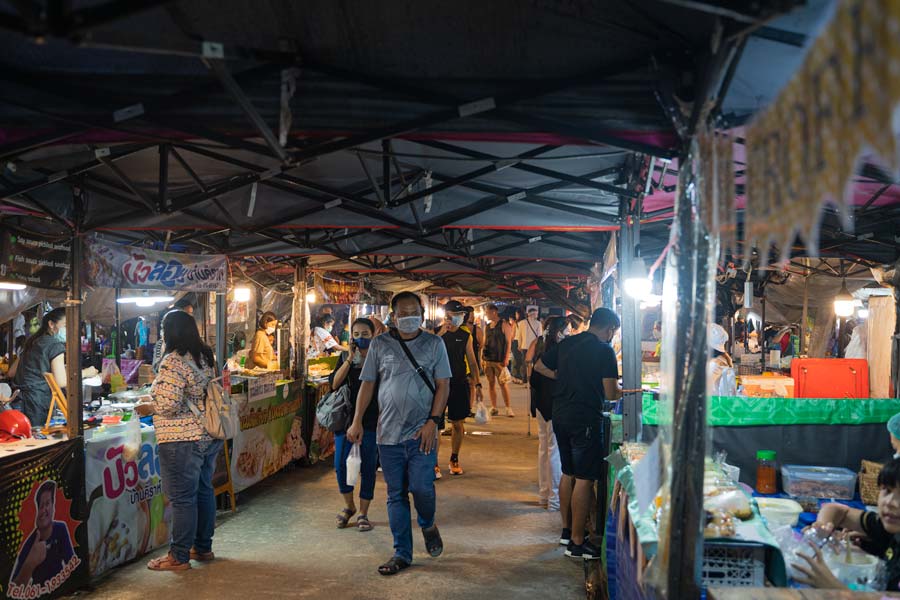
Even though most locals in Thailand speak English, especially in the tourist areas. Knowing the numbers in Thai is a great way to break the ice with them. The locals are always so fascinated and amused when they find foreigners speaking (or trying) to speak Thai.
| English | Thai |
|---|---|
| Zero | Soon |
| One | Neung |
| Two | Song |
| Three | Saam |
| Four | See |
| Five | Ha |
| Six | Hok |
| Seven | Jed |
| Eight | Paed |
| Nine | Gaow |
| Ten | Sib |
Common Thai Phrases and Words FAQs
How To Say “Hello” In Thai?
The word for “Hello” in Thai is “สวัสดี” which is pronounced as “sawadee”. However, Thai language uses gender-based polite particles at the end of sentences. So, men would say “สวัสดีครับ” (sawadee krab) and women would say “สวัสดีค่ะ” (sawadee kha).
How To Say “How are you?” in Thai?
The phrase “How are you?” translates to “สบายดีไหม” in Thai, which is pronounced as “sa baai dee mai?”. Men would typically add krap and women would add kha at the end for politeness. So, it becomes “sabaai dee mai krap?” for men and “sabaai dee mai kha?” for women.
How To Say “I love you” in Thai?
The phrase “I love you” translates to “ฉันรักคุณ” in Thai, which is pronounced as “Chan rak khun”. However, the word “chan” (I) can be replaced with “pom” for males and kept as “chan” for females to make the phrase more gender-specific. So, it becomes “Pom rak khun” for men and “Chan rak khun” for women.
Final Thoughts
Thai might not be an easy language to learn, but navigating the streets of Thailand becomes much more enriching and enjoyable when you can communicate using some basic Thai phrases.
While English is commonly understood in many tourist areas, speaking a little Thai will not only help you immerse yourself in the local culture but also earn you smiles and appreciation from the locals!
